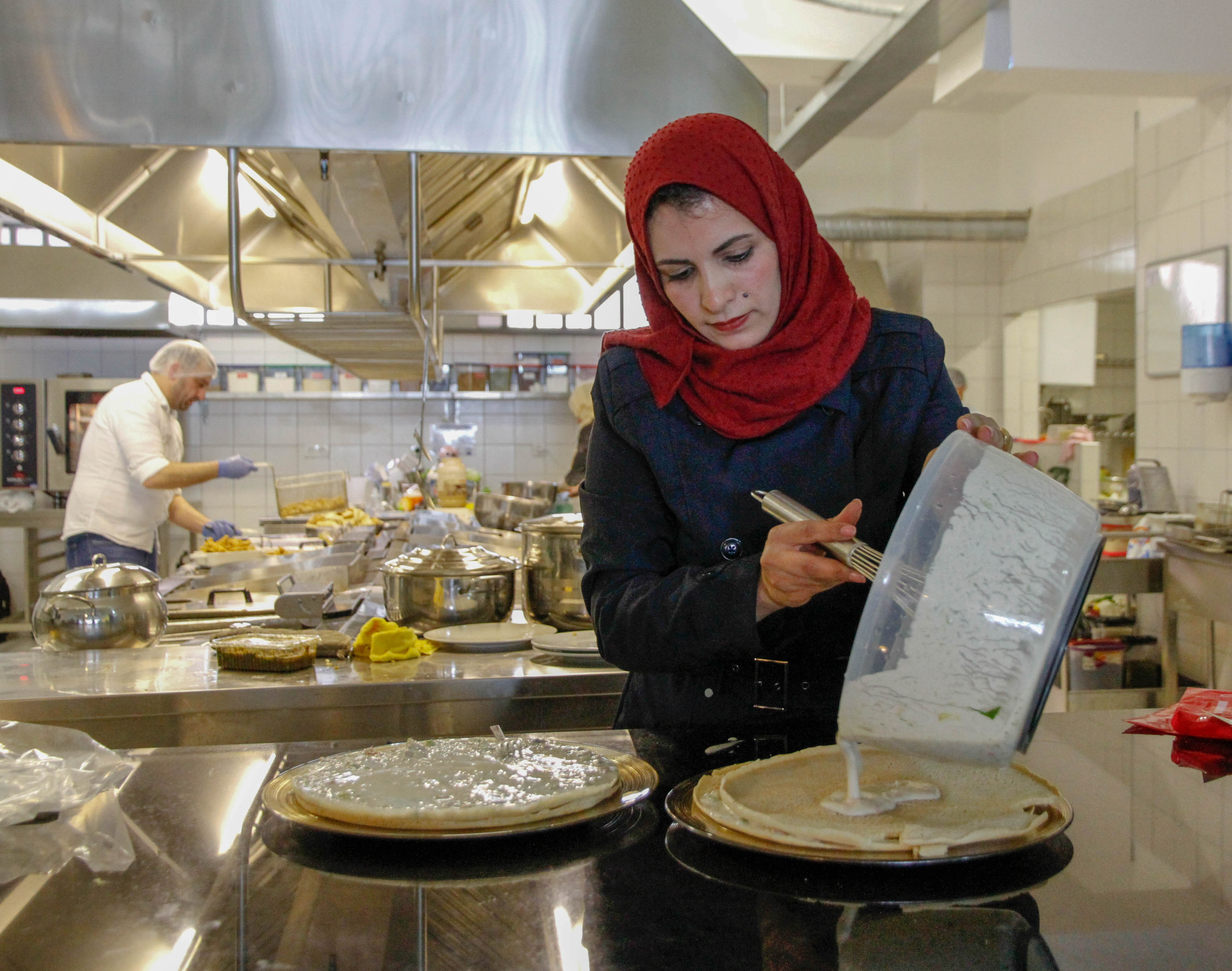
A food entrepreneur works in the shared kitchen at the Food Enterprise Center in Istanbul, part of the Livelihoods Innovation through Food Entrepreneurship (LIFE) Project.
Note: This article was originally published in Business Fights Poverty.
By Kristin Babbie Kelterborn and Amy Gillett at WDI, and
Johanna Mendelson Forman, The Stimson Center
The global refugee population is at the highest level on record and there is no sign of the crisis abating. The most common private sector response is donations to address immediate humanitarian needs. But, with the average displacement ranging from 10 to 26 years, support is also needed to build sustainable livelihoods for refugees, especially as they experience cultural and legal barriers to securing a job in a safe environment in their host countries.
While the Sustainable Development Goals drive some private sector interest in contributing to the refugee crisis response, companies do not always know what concrete steps to take. As members of the United States government funded “Livelihoods Innovation through Food Entrepreneurship (LIFE)” consortium, we have seen firsthand how supporting refugee food entrepreneurship is “one entrée” into promoting livelihoods for refugees. The food sector is attractive for refugee entrepreneurs because of its lower barrier to entry, its accessibility for women, and its opportunities for impact. We call on the private sector to join efforts to make these new businesses successful.
General recommendations for how the private sector can assist refugees have been provided by the United Nations Higher Commission for Refugees, and in a report by the International Finance Corporation and The Bridgespan Group. Yet, guidance to the business community specifically on supporting refugee food entrepreneurship is lacking. What can the private sector do to engage?
With the support of the private sector, food entrepreneurship as a source of livelihoods will grow. By starting food businesses, refugees can better integrate into a new society and be viewed in a more positive way. The growing field of gastrodiplomacy has emerged as a powerful tool for social integration. Food becomes not only a source of income for refugees, but also a way to promote the tastes and flavors of their culture into a new homeland. Their successful social and economic integration leads to richer, more stable communities – and that benefits us all.

Kristin Babbie Kelterborn is the senior project manager at WDI’s Entrepreneurship Development Center.

Amy Gillett is the vice president of WDI’s Education sector.
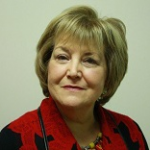
Johanna Mendelson Forman is a distinguished fellow at the Stimson Center, where she heads the Food Security Program.
There are currently about 26 million refugees globally, the highest number on record.
Turkey hosts more refugees than any country in the world, including 3.6 million Syrian refugees. Like refugees in other countries, Syrians in Turkey must find work in order to support themselves and their families in a new country. Because entering the formal labor market is difficult, entrepreneurship gives refugees a potential way to a sustainable livelihood.
To support refugees in building their own businesses in Turkey, the Livelihoods Innovation through Food Entrepreneurship (LIFE) Project has established two food incubators in the cities of Istanbul and Mersin. Refugees participate in a four-month entrepreneurship incubation program and receive business support services. Over two years, the project has graduated more than 250 entrepreneurs.
WDI is a member of the LIFE Project Consortium, which is led by the Center for International Private Enterprise (CIPE) and funded by the U.S. State Department Bureau for Population, Refugees and Migration (PRM). WDI’s Entrepreneurship Development Center leads the design and development of the curriculum for the entrepreneurship incubation program and supports in-country staff with building their instructional skills. In addition to CIPE and WDI, Consortium members include Union Kitchen and The Stimson Center, all based in the United States, and IDEMA, the project’s implementing partner based in Turkey.
In July, WDI’s Amy Gillett, vice president of Education, and Kristin Babbie Kelterborn, senior project manager, along with Eric Fretz, a WDI faculty affiliate and professor at the University of Michigan, traveled to Istanbul and Mersin to lead workshops on entrepreneurship curriculum development, participate in a business pitch competition for Mersin’s second cohort of entrepreneurs and interview program graduates.
Using some of the photos the pair took, Gillett talks about the trip to Turkey, the work they did and the entrepreneurs they met.
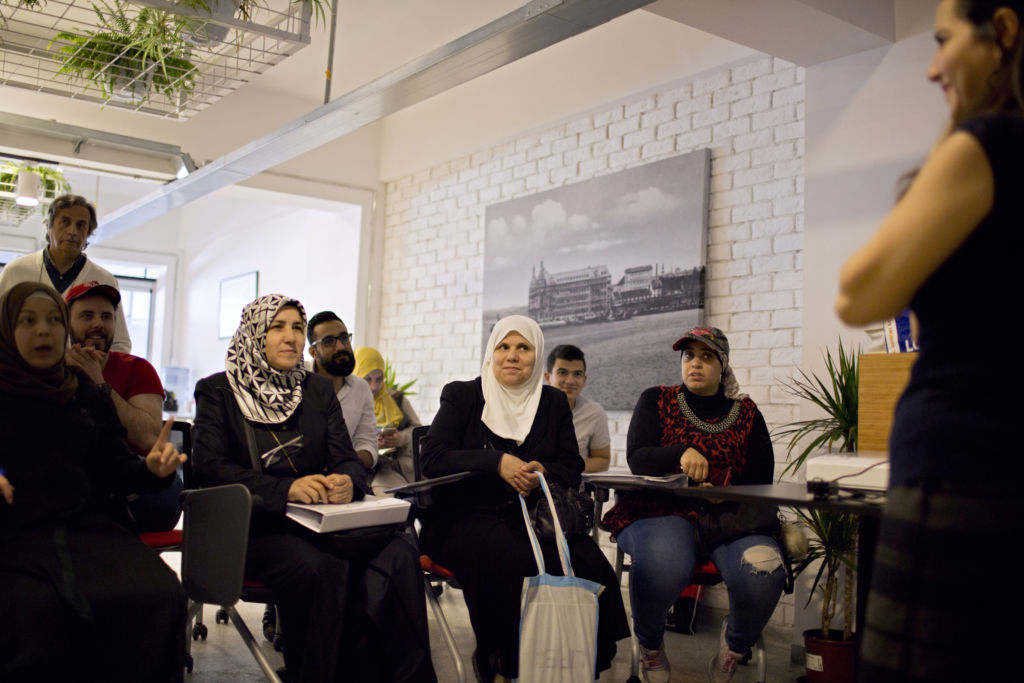
Note: The following post was originally published on NextBillion.net, which is managed by WDI.
By Amy Gillett and Kristin Babbie Kelter
There are currently 25.9 million refugees worldwide, as the world experiences the highest levels of displacement on record. These refugees fled their countries due to war, natural disaster or persecution, and were often forced to leave behind their possessions, as well as their livelihoods. So they are, in many ways, forced to start over upon arrival in their new country.
This process begins with finding a new livelihood. However, refugees may have trouble landing a job due to discrimination, legal barriers, language limitations and lack of social networks. Given these hurdles, it is not surprising that some refugees turn to entrepreneurship out of necessity. Starting a business – especially if their customers are primarily fellow refugees – can allow them to sidestep the obstacles of discrimination and language. It is also attractive in that it enables independence, allowing the entrepreneur to “be their own boss.”
But starting a business is a challenge for anybody, and business failure rates are high. How do refugees — faced with the additional challenges of being new to a country and often not speaking the language — manage to establish successful enterprises? It turns out that along with their unique challenges, they also bring some unique assets to the table. These attributes can both position them for success and enable them to enrich their host nation.
Resilience is an attribute that is often associated with successful refugee entrepreneurs. Experiencing crisis in their home countries, coupled with the difficulties of relocation, help shape a mindset conducive to entrepreneurship. Successful refugee entrepreneurs are driven and have a “one-way ahead” attitude. This attitude is not just about succeeding: It’s about surviving and having a decent, meaningful life after having lost so much. “They really just want to get moving towards a better life in which they are able to work to benefit themselves, but also their families and their communities,” says Mari Kira, a lecturer and research scientist at the University of Michigan whose work explores career and identity growth among refugees.
Rima Bizri, a professor at Rafik Hariri University in Lebanon, wrote a case study of Mostafa, a Syrian refugee who was forced to shut down his restaurant back home, and started a new restaurant in Lebanon. According to Mostafa: “Success meant a lot to me, but survival meant even more … To me, failure meant starvation and homelessness … Failure was unthinkable.” Mostafa was supported by his wife, who shared his vision and drive. “All we could talk about is the restaurant … our lives were centered on the restaurant … it was our passion,” she said.
Indeed, refugee entrepreneurs are rarely alone in their entrepreneurial journey. They’re able to enlist the support of their family members, and fellow countrymen and countrywomen, by creating a shared vision and showing how the business will benefit all of them. This social network can be a vital source of labor and moral support. By tapping this network for employees, refugee entrepreneurs find workers who speak their language, have similar cultural values, feel an obligation to one another and have compassion for them. Even those who aren’t blood relatives come to be treated as members of the family, creating a “pseudo-family business.” Such a strong unit has an inherent advantage in finding entrepreneurial success: Notably, nearly one-quarter of small businesses fail because they haven’t assembled the right team.
Furthermore, refugees tend to be good at bootstrapping their businesses. They start out with their personal savings, and sometimes supplement that with contributions from friends and family. Money earned from customers is plowed back into the business. Since outside capital is generally not an option, they become adept at reducing their operating costs to a minimum and drawing on their social networks for support when needed.
Take the case of Shaker Moutraji, a member of the U.S.-government funded Livelihoods Innovation through Food Entrepreneurship (LIFE) Project. He owned seven sweet shops in Syria — specializing in cheese Mamul — before he closed them the week the civil war began. After leaving Syria, Moutraji did not have any capital to open a cheese Mamul production business in his new home in Mersin, Turkey. To overcome this barrier and launch a business, he bootstrapped by borrowing 600 Turkish Lira (about US $100) to purchase a used refrigerator and ingredients to get started.
While some refugee entrepreneurs may remain small and limited to serving the market of fellow refugees, others will move beyond this “enclave economy.” When refugee entrepreneurs offer goods and services that are competitively priced and in demand, host community members will become customers. They will benefit from these valuable new products and services, and the entrepreneurs will enjoy access to a much larger market.
For example, Fatma Ahmed, who fled from the armed conflict in Yemen, is working to reopen the pastry shop she had owned back home – but this time in Istanbul. Ahmed, also a member of the LIFE Project, understands the importance of tapping into the Turkish market to expand her customer base. She is learning as much as she can about Turkish culture, which is crucial for marketing her business to Turkish customers.
But even with a high drive to succeed and a solid business model, refugee entrepreneurs can still be stymied by obstacles. To help these entrepreneurs succeed, institutions within host countries can offer various types of support. Governments should help them register and operate their businesses as legal entities, as well as facilitate their access to international markets, such as through participation in trade expos. Governments should also seek to provide human and social services, such as education for youth, language classes, and access to social workers, health care, and basic needs like housing and food.
NGOs, support organizations like accelerators and incubators, and local universities can also help refugee entrepreneurs. They can assist by providing counsel on legal and export matters, providing office space and equipment during the initial startup phase, and offering training on relevant topics such as business models, marketing, customer service, finance and accounting, and human resource management.
When entrepreneurship support programs are created, they should, when possible, be open to both refugees and the host community. An influx of refugees in a community can lead to a strain on local resources like housing, schools, and jobs, especially in areas that were already experiencing economic instability. The competition over resources – in combination with varying social norms and the temporary status of refugees – can make it difficult for refugees and host communities to come together as one community. Entrepreneurship programs that engage refugees can seek to build social cohesion by opening the program to a diverse audience and facilitating positive interactions. A successful example of this is the International Labour Organization’s Ready for Business program, piloted recently in Indonesia. The program provides entrepreneurship training to refugees from Afghanistan, Somalia, Eritrea, Ethiopia, Yemen, Iraq, Myanmar and Sudan – as well as local youth in the Jakarta neighborhoods where refugee shelters are located. The LIFE Project takes a similar approach to building sustainable livelihoods through entrepreneurship: its food incubator model and suite of business support services in Turkey engage refugees from countries such as Syria, Yemen, Palestine and Iraq, as well as local Turks. The project also has a gastrodiplomacy component to facilitate meaningful connections across cultures, using food as a vehicle.
While every refugee entrepreneur has a unique story, those who are successful can challenge the negative perceptions and images of refugees that often arise during humanitarian crises. This can help their host communities shift from viewing refugees as a financial and social burden, to seeing them as a source of vitality, spurring economic growth and job creation and introducing new products to the market. Successful refugee entrepreneurs bring focus, drive and commitment to their ventures, modeling the mindset any entrepreneur needs to grow a business.
Amy Gillett is the vice president of education at WDI. Kristin Babbie Kelterborn is a senior project manager at WDI. They lead WDI’s Entrepreneurship Development Center.
The authors would like to thank Rimi Bizri, Mari Kira, Eric Fretz and Ozge Savas for their contributions.
Photo courtesy of the Life Project.
WDI collaborated with a consortium led by the Center for International Private Enterprise on the Livelihoods Innovation through Food Entrepreneurship (LIFE) Project, funded by the U.S. Government. Other consortium members included IDEMA, Union Kitchen, and The Stimson Center. During 2017-2020, the LIFE Project had established two Food Enterprise Centers (based in Istanbul and Mersin, Turkey) where entrepreneurs participated in an entrepreneurship incubation program and had access to shared kitchen space for testing and producing their products. The mission of the LIFE Project was to support and encourage entrepreneurship, job creation, and cross-cultural engagement in the food sector. The LIFE Project’s entrepreneurship incubation program built sustainable livelihoods by equipping refugees and members of the host communities with the skills and knowledge they needed to build successful businesses. Underlying LIFE Project activities was gastrodiplomacy – that is, leveraging food as a medium for cross-cultural engagement.
With the obstacles brought on by the COVID-19 pandemic in 2020, the Project’s strategy required a pivot as in-person training at the Food Enterprise Centers ceased. The WDI team provided guidance to IDEMA, the implementing partner, as they shifted to offering the in-person entrepreneur incubation training to an online format. The WDI team also facilitated an online workshop about resilience during the COVID-19 pandemic to help equip the consortium with the skills to meet the changing needs of the project participants during the challenging time.
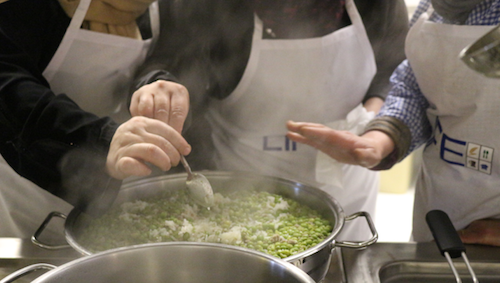
Note: The following was originally published on NextBillion.net, which is managed by WDI.
By Kristin Babbie Kelterborn and Amy Gillett
An entrepreneur in São Paulo seeks to refine palates by introducing unfamiliar Syrian dishes to the city and showing the uniqueness of his country’s cuisine – differentiating it from common and broadly labeled “Middle Eastern” food. In Toronto, a restaurant offers traditional Syrian dishes with a contemporary twist, such as manaeesh flatbread topped with avocado. In Washington, D.C., a chef from Damascus serves up his family recipes through a food delivery business for emerging immigrant chefs. These are just a handful out of thousands of stories of Syrian refugees starting food businesses in host countries and shaping those host communities’ perceptions of their culture through food.
In Istanbul, Mohamad Bakkar, a Syrian refugee and now food entrepreneur, produces his own special Syrian cheeses and yogurt. About three and a half years ago, Bakkar fled the civil war in Syria, where he was an electrical engineer. As a refugee in a new place, life was not easy. To improve his family’s situation, Bakkar opened his own food business in Istanbul. A year and a half since its founding, the business is growing and now has four employees. “It is the best way for a refugee who lives in Istanbul to earn money,” said Bakkar.
Syrians began fleeing their country against the backdrop of the Arab Spring, which first ignited in Tunisia and then spread throughout the Middle East and North Africa. Syria’s Arab Spring began in 2011, eventually leading to a catastrophic civil war and the proliferation of the Islamic State in the country. As of February 2016, 470,000 Syrians had lost their lives in the conflict and more than 6 million were internally displaced.
Turkey hosts more than half of all Syrian refugees, with some 3.5 million registered Syrian refugees in Turkey. Under Turkey’s Temporary Protection Regulation, Syrian refugees are eligible for free access to basic services such as healthcare and education. In the beginning of the Syrian refugee crisis, Turkey had planned to host the refugees in the short term only, not expecting the conflict in Syria to remain unresolved for years. The unprecedented magnitude of refugees and unanticipated length of their stay has presented widespread challenges to Turkey, from education to health to economic opportunities.
One of the greatest challenges for Syrian refugees is securing a job. Syrian refugees tend to work in the informal sector, so their jobs are not considered legal and do not come with social security benefits. Further, these jobs pay poorly and have substandard work environments. Despite the relative ease of establishing a business in Turkey, building a business is difficult anywhere, and Syrians in Turkey have the added challenge of doing so in a new country.
Enter the LIFE project. In 2017, the Washington, D.C. based non-profit Center for International Private Enterprise (CIPE) contacted the William Davidson Institute’s Education Initiative and its Entrepreneurship Development Center about partnering on the project. (Note: WDI is the parent organization of NextBillion). WDI agreed to join a consortium of U.S. and Turkey-based partners to launch Livelihoods Innovation through Food Entrepreneurship (LIFE). The U.S. State Department-funded project establishes two incubators, or Food Enterprise Centers, to support refugees and the Turkish host community in building businesses in the food sector.
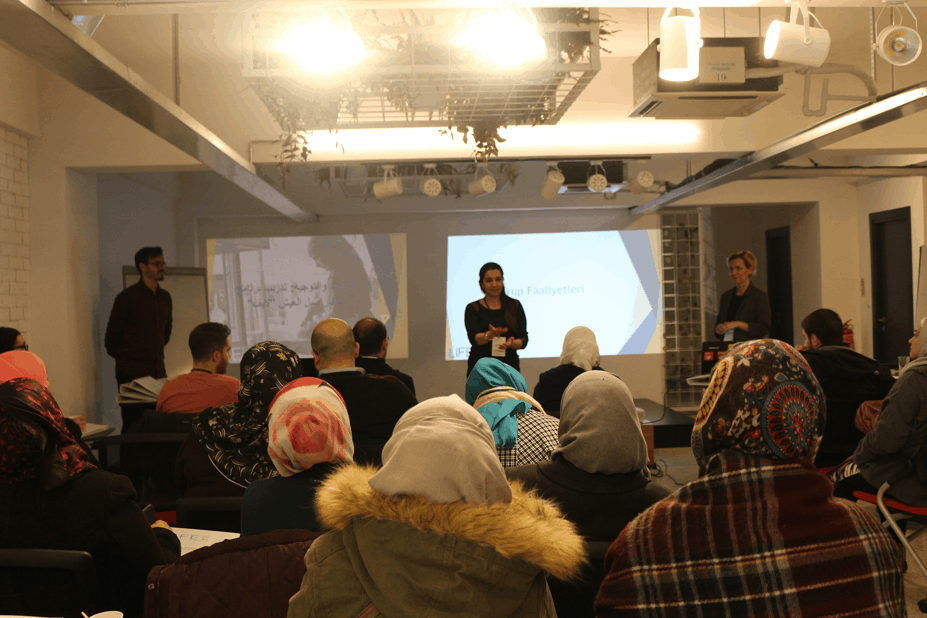
The first cohort of LIFE entrepreneurs attend a program orientation session in the new LIFE Food Enterprise Center in Istanbul. (Photo courtesy of IDEMA)
“Turkish and Syrian food cultures are similar. Syrian food is also loved by the Turkish host communities,” said Esra Arslan, Project Manager at IDEMA — an Istanbul-based non-profit dedicated to socioeconomic development. “With a good, solid business plan, even with little experience, it is most likely that your business will survive in the food sector than in any other sector in Turkey.”
Through the two-year LIFE project, 240 entrepreneurs will participate in a four-month program at the Food Enterprise Centers. (Mohamad Bakkar is a member of the Food Enterprise Center in Istanbul.) The program offers comprehensive entrepreneurship support services, the chance to participate in a business pitch competition, space in a shared commercial kitchen, access to mentorship, and legal and financial advice. Entrepreneurs will also attend people-to-people gastrodiplomacy events that use food as a medium for cross-cultural exchange among the participants.
“Gastrodiplomacy is especially important in the context of the current environment in Turkey,” says Johanna Mendelson Forman, Distinguished Fellow at the Stimson Center and leader of the LIFE gastrodiplomacy programming. “Bringing Syrian refugees together with Turkish citizens – all learning to build businesses around food – creates community and builds trust. Food plays a powerful role in helping to bridge cultural divisions by sharing a meal, or breaking bread. After all, the word ‘company’ is derived from the concept of coming together (‘com’) over bread (‘pan’), and Syrians are company in their new homeland.”
(You can learn more about gastrodiplomacy in an interview with Mendelson Forman featured here).
Turkey has a high unemployment rate and about one third of its private sector workforce is employed informally. As the country enters its eighth year of hosting Syrian refugees, job scarcity is a source of strain between Turkish host communities and these refugees. Most Syrian refugees in Turkey live among members of the host community, not in camps, alongside other refugees and Turkish citizens. Initiatives that work to socially integrate Syrian refugees into these communities and enhance cultural understanding between refugees and Turkish host communities are vital.
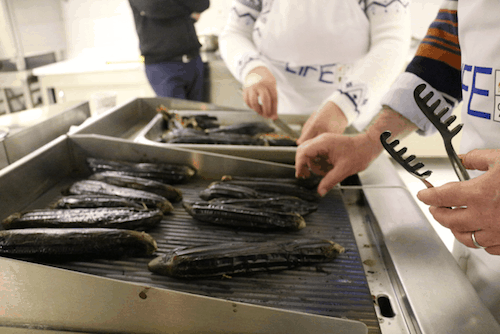
LIFE entrepreneurs cook eggplants – the key ingredient in Mutabal – during the opening event for the LIFE Food Enterprise Center in Istanbul. (Photo courtesy of IDEMA)
The LIFE project aims to promote this social cohesion through gastrodiplomacy. The program is open to anyone, including refugees from other countries and Turkish citizens, in addition to Syrians. Participants go through the program as a cohort, getting to know each other― including their different traditions and cultures ― along the way. Cross-cultural exchange events are held at the Food Enterprise Centers. Recipes with accompanying background stories will be collected from participants to feature in a cookbook.
Mendelson Forman says, “As Ramadan approaches we are planning to host gastrodiplomacy events at the food entrepreneurship incubators. Refugee trainees hosting Iftar, or fast-breaking dinners, at the centers affords an opportunity for people in the neighborhoods to learn more about different cultures and cuisines, and to do so in a neutral environment.”
The LIFE project welcomed its first cohort of entrepreneurs in February 2018. The creativity and desire to innovate exhibited by these entrepreneurs is extraordinary, and shows the potential of Syrian refugees – as well as Turkish citizens and other refugees – to discover sustained livelihoods as entrepreneurs in the food sector. Through the LIFE Food Enterprise Centers, a butcher wanting to be the next Salt Bae, an agricultural engineer creating a new product line of honey, or a pharmacist developing medicinal dishes will receive the necessary support to launch and build their enterprises in Turkey.
Kristin Babbie Kelterborn is a senior project manager at the William Davidson Institute at the University of Michigan.
Amy Gillett is the vice president of Education at the William Davidson Institute.
The authors thank their colleagues at IDEMA for interviewing and providing information about the entrepreneur, Mohamad Bakkar, profiled at the beginning of the article.
The Livelihood Innovations through Food Entrepreneurship (LIFE) project is made possible by the United States Government. The LIFE project is a collaborative effort of its consortium members, which include the Center for International Private Enterprise, IDEMA (International Development Management), Union Kitchen, The Stimson Center, and The William Davidson Institute at the University of Michigan.
Johanna Mendelson Forman is a leading voice in the emerging movement of social gastronomy. She visited WDI and the University of Michigan in March to discuss how food can promote social good. She also leads the gastrodiplomacy programming for the U.S. State Department-funded project “Livelihoods Innovation through Food Entrepreneurship,” or LIFE project, implemented by a consortium, which includes: Center for International Private Enterprise (CIPE), IDEMA, The Stimson Center and WDI. The LIFE project aims to develop sustainable livelihoods in the food sector for Syrian refugees, other refugee groups, and their host communities in Turkey. While at WDI, Mendelson Forman, a distinguished fellow at the Stimson Center where she heads the Food Security Program, was interviewed by Kristin Babbie Kelterborn, senior project manager at WDI.
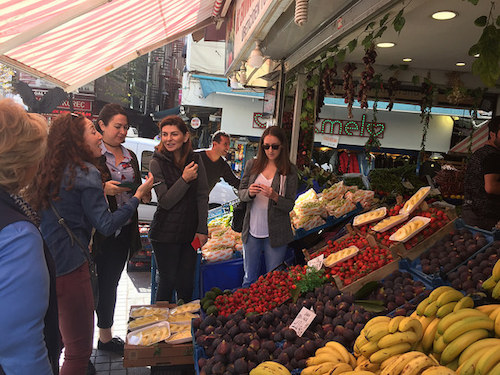
Members of the LIFE project consortium visit a produce stand in Turkey and interviews the owner on how a green grocer sources his produce and his perspective on how he could potentially benefit from the LIFE Food Enterprise Center.
Food can be a powerful means to a more peaceful world because it encourages conversation, cross-cultural engagement and understanding during troubled times, according to the next speaker for the WDI Global Impact Speaker Series.
Johanna Mendelson Forman, a leading voice in the emerging movement of gastrodiplomacy and social gastronomy, will talk about how food can promote social good at her talk, “Can a Hamburger Build World Peace? Lessons on How Food Builds Community One Plate at a Time.” Her talk will be at 5 p.m. on Wednesday, April 4 in Room R2220 at the Ross School of Business. It is free and open to the public.
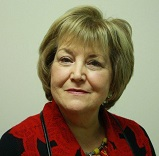
Mendelson Forman
Mendelson Forman said a revolution is building in which food has become a vehicle for a generation that features chefs as political actors, farmers as champions of environmental sustainability and businesses that have embraced the belief that investment in the entire supply chain is good for business. Young social entrepreneurs are combining food and their business expertise to promote social good with new apps and new inventions. Refugees are learning to cook in their new land in order to gain respect and sow hope.
“Everyone has memories about dishes they ate growing up,” said Kristin Babbie Kelterborn, a WDI senior project manager. “Many times, these recipes have been passed down through generations, giving us a way to feel connected to our culture, bond with others and shape our identity. In many cultures, food is incredibly significant; it is a way of showing hospitality, love and respect.”
“Dr. Mendelson Forman’s presentation will provide insight on what happens when people from different backgrounds share their food cultures with one another. She will talk about a food entrepreneurship project that WDI is currently involved in, which uses food to promote cross-cultural exchange between refugees and host communities in Turkey.”
Under WDI’s Entrepreneurship Development Center, Kelterborn is working on a project, led by the Center for International Private Enterprise and implemented with a consortium of U.S. and Turkey-based partners that aims to develop sustainable livelihoods in the food sector for Syrian refugees and their host communities in Turkey. The project, “Livelihoods Innovation through Food Entrepreneurship,” or LIFE, is establishing Food Enterprise Centers in two Turkish cities to provide business support services to 240 entrepreneurs over two years. The centers will serve as incubators, offering kitchen space and business support services. In addition, the centers will host gastrodiplomacy events using food as a means to promote cross cultural understanding. Mendelson Forman is leading the gastrodiplomacy component of the LIFE project. Sponsored by the US State Department, the consortium includes partners IDEMA (International Development Management), Union Kitchen and The Stimson Center, as well as CIPE and WDI.
Mendelson Forman is an adjunct professor at the School of International Service at American University in Washington, D.C. where she created an interdisciplinary course, Conflict Cuisine®: An Introduction to War and Peace Around the Dinner Table. She is a distinguished fellow at the Stimson Center, where she heads the Food Security Program.
She also has written extensively about food, conflict and Latin America, and has lectured on food-related topics at the Smithsonian Resident Associates Program, Johns Hopkins University Bologna Campus, New York University’s Washington Program and at the United States Pavilion of the 2015 World Expo in Milan, Italy.

By Amy Gillett
Note: This blog post also appeared on NextBillion.net, which is managed by the William Davidson Institute at the University of Michigan.
I recently had the opportunity to spend time with author and professor Elmira Bayrasli. I was truly inspired after reading her book “From the Other Side of the World: Extraordinary Entrepreneurs, Unlikely Places,” and recently invited her to speak to students and faculty at the University of Michigan.
In her book, Bayrasli looks at the emergence of entrepreneurship in seven developing countries — including India, Nigeria, Mexico, and Russia — by detailing the journeys of local entrepreneurs and the obstacles they had to overcome to build high-growth businesses. These obstacles included poor infrastructure, corruption and a culture of bribery, and a lack of public spaces where business-minded folks could congregate, converse and have the kinds of chance meetings that often spark innovation.
My interest in this topic stems from working on entrepreneurship development over the past dozen years at the William Davidson Institute. (Note: WDI is the parent organization of NextBillion). I’ve overseen programs training women to scale up businesses in Rwanda as part of the Goldman Sachs 10,000 Women project, bringing new entrepreneurship pedagogy and curricula to universities in Papua New Guinea, and running a social entrepreneurship virtual program that brings U.S. students together with counterparts in the Middle East to come up with entrepreneurial solutions to pressing problems.
I was interested to hear Bayrasli’s perspective on why entrepreneurship is exploding in developing economies. She credits the combination of technology and globalization. Both forces help entrepreneurs make new connections – which are key for raising capital, coming up with fresh ideas and generating new business models. One of the successful entrepreneurs she highlights in her book, Monis Rahman, created Pakistan’s first matchmaking website and its most successful job search website, having tapped LinkedIn founder Reid Hoffman for advice, as well as other contacts he developed while studying at Stanford and working in Silicon Valley. The title of that chapter, “Steve Jobs Lives in Pakistan,” sums it up well.
Another factor Elmira mentioned is the trend of many entrepreneurial young people seeking to return to their home countries after completing a Western education. She contrasted this with her experience in Turkey, where her parents emigrated from before settling in the U.S. In the past, ambitious Turks dreamed of moving to the United States. Now they see opportunity in their home country and feel pride about being from there. They see homegrown successes – such as Mavi Jeans and AirTies, a wireless network company Bayrasli also profiles in her book – and they want to return and create businesses too. Not only do these successful companies provide inspiration, they’ve also helped transform the way Turkish business operates, setting new standards based on global best practice and leaving the old, corrupt practices behind.
I found Bayrasli’s perspectives on global entrepreneurship fascinating. An area where our thinking diverges, however, is on the role of education and the question of whether entrepreneurship can be taught. Bayrasli contends that aspiring entrepreneurs are best served by studying the classics – she recommends reading Tolstoy for instance – to understand human motivation and gain empathy. She doesn’t believe entrepreneurship is best taught in business schools. While I appreciate Tolstoy just as much as the next Russian literature major, I have come to see the value of teaching business skills – from negotiating to marketing to basic finance – to those who at least have a fledgling business and are looking for guidance on how to grow it to the next level. While Steve Jobs, Bill Gates, and Mark Zuckerberg were all college dropouts and never returned to school for a certificate in entrepreneurship, I see them as outliers in the world of entrepreneurship – exceptionally gifted, surrounded by savvy businesspeople, and lucky in their timing.
I hope you enjoy my interview with Bayrasli, available below.
Amy Gillett is vice president of the Education Initiative at the William Davidson Institute at the University of Michigan.
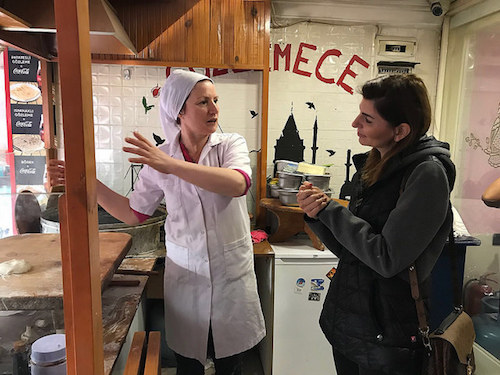
A member of the LIFE project consortium speaks with a Turkish business owner of a small crepe restaurant about her perspective on hiring people of different cultures, including Syrian refugees.
Two WDI representatives traveled to Turkey earlier this month as part of the Institute’s work on a project, led by the Center for International Private Enterprise (CIPE), that aims to develop sustainable livelihoods in the food sector for Syrian refugees and their host communities.
WDI Senior Project Manager Kristin Babbie Kelterborn and WDI Faculty Affiliate Peter Scott traveled to Istanbul and Gaziantep to collaborate with other project partners to conduct a mapping and discovery process to understand the specific needs of the target populations.
The project, “Livelihoods Innovation through Food Entrepreneurship,” or LIFE, will set up Food Enterprise Centers (FECs) in the two Turkish cities to train 20-40 entrepreneurs at a time on how to run food-based businesses. The centers will serve as incubators, and in addition to a kitchen, will feature space for meetings, co-working and training.
Scott has experience teaching entrepreneurship courses at various universities, conducting entrepreneurship training programs in Bahrain and Papua New Guinea, and has advised over 20 start-ups as a business development consultant. Kelterborn supports WDI’s Entrepreneurship Development Center (EDC) and brings her academic training in the sociology of food and agriculture, as well as her previous experience providing business development support to food and agriculture-based businesses at an accelerator, to the project.
During the trip, Kelterborn and Scott participated in a mentorship environment assessment, and developed a summary of the trip with a detailed action plan for upcoming program phases.

Members of the LIFE project consortium visit a produce stand in Turkey and interview the owner on how a green grocer sources his produce. The team sought his perspective on how he could potentially benefit from the LIFE Food Enterprise Center.
WDI will also develop tools for establishing an entrepreneur mentoring program at the FECs. Finally, WDI is represented on the Steering Committee of the LIFE project. In this capacity, the Institute will provide entrepreneurship-related advice and expertise on the structure and setup of the FECs and contribute ideas for a local ownership model to promote sustainability beyond the lifecycle of the program, among other duties.
The FECs will also provide workforce development training for an anticipated 1,000 workers in the food sector covering topics such as food and beverage management, procurement, and customer service skills.
In addition to CIPE and WDI, other members of the project consortium are: Union Kitchen; IDEMA (International Development Management); and, The Stimson Center.
Turkey has the largest refugee population in the world, including more than 3 million Syrians, a number that stood at about 170,000 at the end of 2012. Most of the Syrians entering Turkey have fled the country’s civil war. Formal unemployment among the refugee population is high, and tensions have flared between refugee and citizen communities.
The food sector in Turkey is a promising pathway for Syrian refugees to strengthen their livelihoods, ultimately benefitting the Turkish economy and society. Using food as a means of cross-cultural engagement and understanding, known as “gastrodiplomacy,” is a main focus of the LIFE project.
“Food is an effective way to foster cross-cultural connections,” said Amy Gillett, vice president of WDI’s Education Initiative and the EDC. “The South Koreans are known for ‘kimchi diplomacy’ – forging ties globally and building a strong country brand through popularizing their famous fermented cabbage and dishes such as bibimbap. We hope to see similar goodwill arise from this project, with Syrian specialties like manoushi bread and fatteh reaching more palates and opening up new opportunities for Syrian refugees.”
WDI Senior Fellow Ted London delivered a keynote address on April 8 at the G20-B20 Workshop on Inclusive Business in Ankara, Turkey. The workshop precedes the April 9-10 G20 Development Working Group (DWG) meeting, also in Ankara.
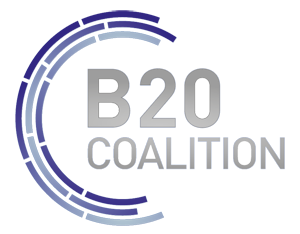
London spoke to attendees from government, business, international organizations, and civil society groups about his thoughts on “The Status of Inclusive Business and Challenges for Scaling Up.”
The goal of the workshop was to create a common framework and policy environment for inclusive business (IB) based on existing case studies of IB models in the private sector and on previous IB policy recommendations for governments and donors. The workshop built upon the G20’s extensive previous IB-related work and the knowledge generated within the IB field to-date in order to address how the policy environment related to IB can advance the opportunities for private sector companies to further reach the poor.
The Group of Twenty (G20) is the premier forum for its members’ international economic cooperation and decision-making. It comprises 19 countries plus the European Union. G20 leaders meet annually.
The Business 20 or B20 is an outreach group of the G20 which represents the international business community. Bringing together business leaders from across the globe, the B20 reflects the private sector’s role as the driver of strong, sustainable, and balanced economic growth.